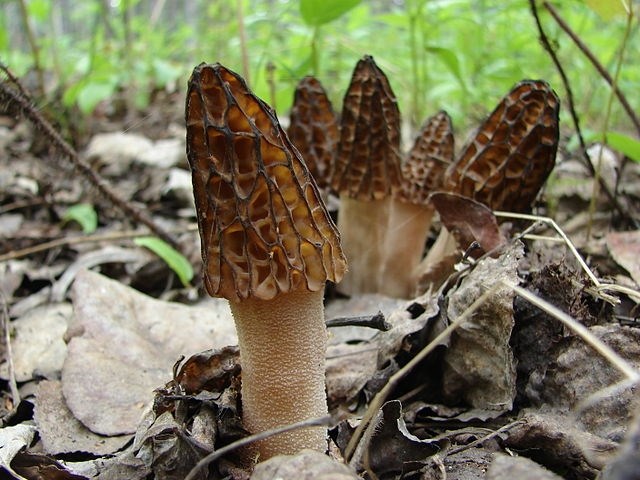
Black morel mushrooms are pictured in this Wikimedia Commons photo taken near Prince George, B.C. on March 4, 2009.
Image Credit: WIKIMEDIA COMMONS/Johannes Harnisch
July 22, 2020 - 6:30 AM
With the cool and wet spring experienced by most of the province, it’s looking like a good year for wild mushroom foraging in British Columbia.
However, after a particularly active year for mushroom poisonings in B.C. in 2019, an Okanagan mushroom expert is advising those intending to go searching for fungi to use caution and seek expert advice when harvesting wild mushrooms this summer and fall.
Associate professor in the UBC Biology department Daniel Durall teaches microbiology, mycology, botany and ecology at UBC’s Okanagan campus.
He says the early moisture this spring, in addition to a wet June and damp start to July, has brought mushrooms out earlier than expected.
“We’re finding things growing we would normally find in the fall. People might be out foraging early this year, and the message is to be careful. Last year was a good year, and this one is looking to be even better,” he says.
The B.C. Centre for Disease Control reports over 200 mushroom poisonings in the province in 2019.
Durall says most mushrooms won’t kill you, but a couple do have the potential to.
“People need to be careful,” he says.
The most notorious mushroom in B.C. known for its lethal qualities is the death cap mushroom, a non-native fungus that was introduced in the late 1800s or early 1900s to the province, probably on ornamental trees imported from Europe. The death cap is being found with increasing frequency in Vancouver and Victoria. It likes to grow on the roots of ornamental trees, the type planted by municipalities on roadsides and in parks.
Durall says the death cap hasn’t yet been found on native plants in the Okanagan.
The death cap has the potential to block an enzyme in the body that’s important in synthesizing proteins. The body can’t regenerate cells, and eventually liver and kidney failure takes place unless treated very early.
“It takes about 14 days, but there is a ‘honeymoon period' after three days when the symptoms go away. But they come back in about a day and eventually it affects the liver and kidneys,” Durall says.
There are two types of fungi that produce mushrooms. Store-bought mushrooms like white button or cremini mushrooms live on dead organic matter, while the white chanterelle, often sought after in the B.C. Interior, is associated with the roots of forest trees.
The best foraging locations often depend on the time of year. Recently burned areas can be good for morel mushrooms, and the chanterelle can be found in the Kootenays, and North Okanagan in the Mabel Lake and Enderby areas.
“Go out with an expert. There are some species that will stain yellow that won’t kill you, but they’ll make you very sick. Have some rules. For instance, don’t eat raw mushrooms, because there are incidents where people have eaten raw mushrooms that contained a toxin that disappeared after it was cooked,” he says.
Durall says anything that stains yellow should be avoided. If you scratch the surface and it stains yellow, avoid it.
The same rule applies to puffballs, and if a puffball turns yellow-brown inside when you slice it instead of a cream cheese colour, it’s not worth eating either.
Durall says mushroom pickers have a number of experts in B.C. to consult from, including himself, Andy MacKinnon, Tyson Ehlers, Shannon Berch and Hagues Massicotte.
“If you’re going to pick mushrooms this summer or fall, I can’t overemphasize the need to be careful. There were more than 200 calls to the poison control centre last year, and with another good year for mushrooms, this year could be worse,” he says.
To contact a reporter for this story, email Steve Arstad or call 250-488-3065 or email the editor. You can also submit photos, videos or news tips to tips@infonews.ca and be entered to win a monthly prize draw.
We welcome your comments and opinions on our stories but play nice. We won't censor or delete comments unless they contain off-topic statements or links, unnecessary vulgarity, false facts, spam or obviously fake profiles. If you have any concerns about what you see in comments, email the editor in the link above.
News from © iNFOnews, 2020